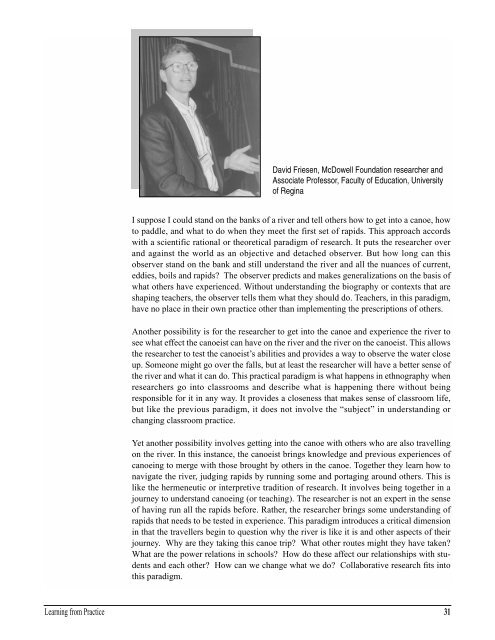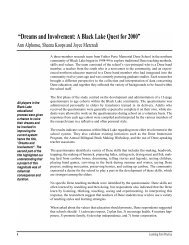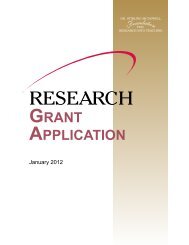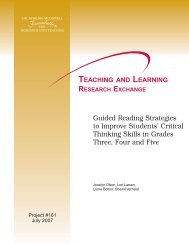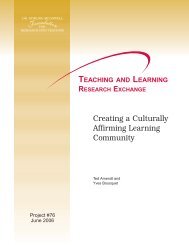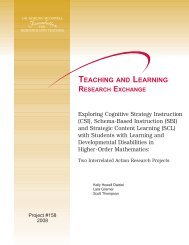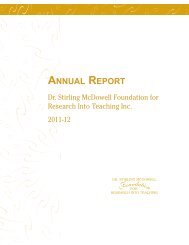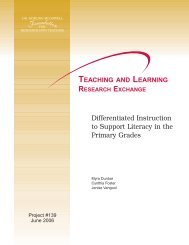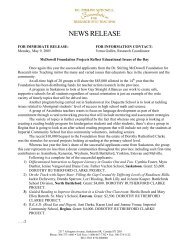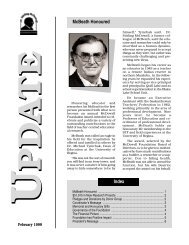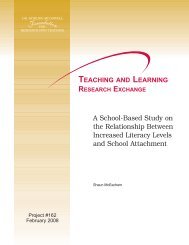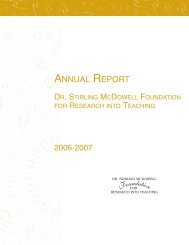Research Bulletin, Vol. 1, No. 2, 1996 - Dr. Stirling McDowell ...
Research Bulletin, Vol. 1, No. 2, 1996 - Dr. Stirling McDowell ...
Research Bulletin, Vol. 1, No. 2, 1996 - Dr. Stirling McDowell ...
You also want an ePaper? Increase the reach of your titles
YUMPU automatically turns print PDFs into web optimized ePapers that Google loves.
David Friesen, <strong>McDowell</strong> Foundation researcher andAssociate Professor, Faculty of Education, Universityof ReginaI suppose I could stand on the banks of a river and tell others how to get into a canoe, howto paddle, and what to do when they meet the first set of rapids. This approach accordswith a scientific rational or theoretical paradigm of research. It puts the researcher overand against the world as an objective and detached observer. But how long can thisobserver stand on the bank and still understand the river and all the nuances of current,eddies, boils and rapids? The observer predicts and makes generalizations on the basis ofwhat others have experienced. Without understanding the biography or contexts that areshaping teachers, the observer tells them what they should do. Teachers, in this paradigm,have no place in their own practice other than implementing the prescriptions of others.Another possibility is for the researcher to get into the canoe and experience the river tosee what effect the canoeist can have on the river and the river on the canoeist. This allowsthe researcher to test the canoeist’s abilities and provides a way to observe the water closeup. Someone might go over the falls, but at least the researcher will have a better sense ofthe river and what it can do. This practical paradigm is what happens in ethnography whenresearchers go into classrooms and describe what is happening there without beingresponsible for it in any way. It provides a closeness that makes sense of classroom life,but like the previous paradigm, it does not involve the “subject” in understanding orchanging classroom practice.Yet another possibility involves getting into the canoe with others who are also travellingon the river. In this instance, the canoeist brings knowledge and previous experiences ofcanoeing to merge with those brought by others in the canoe. Together they learn how tonavigate the river, judging rapids by running some and portaging around others. This islike the hermeneutic or interpretive tradition of research. It involves being together in ajourney to understand canoeing (or teaching). The researcher is not an expert in the senseof having run all the rapids before. Rather, the researcher brings some understanding ofrapids that needs to be tested in experience. This paradigm introduces a critical dimensionin that the travellers begin to question why the river is like it is and other aspects of theirjourney. Why are they taking this canoe trip? What other routes might they have taken?What are the power relations in schools? How do these affect our relationships with studentsand each other? How can we change what we do? Collaborative research fits intothis paradigm.Learning from Practice 31


